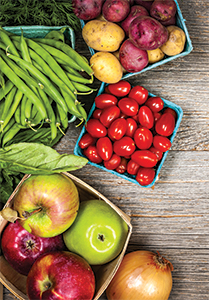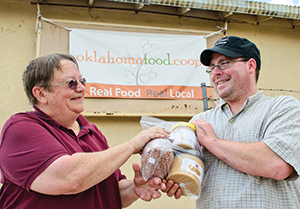Farm Fresh Food
 Modern society too often favors convenience over quality, which is manifested in the foods comprising the modern American diet. Browse the ingredients of any packaged food product from your local grocery store and you will encounter unpronounceable items like acesulfame potassium, glyphosphate or butylated hydroxyanisole that more closely resemble a chemistry experiment than a nutritious meal.
Modern society too often favors convenience over quality, which is manifested in the foods comprising the modern American diet. Browse the ingredients of any packaged food product from your local grocery store and you will encounter unpronounceable items like acesulfame potassium, glyphosphate or butylated hydroxyanisole that more closely resemble a chemistry experiment than a nutritious meal.
Food cooperatives and farmers’ markets allow farmers to offer a variety of locally-grown products, often free of the additives, preservatives and other modifications that permeate the American diet. The Edmond Farmer’s Market has been popular for several years, as have several throughout Oklahoma City.
The Oklahoma Food Cooperative, a statewide organization of producers, allows metro consumers to purchase fruits, vegetables, meats and dozens of other products with no mystery ingredients or genetic modifications. Every item offered for sale is from Oklahoma. Consumers can choose from a variety of pastured chickens and their eggs, grass-fed beef and other minimally processed foods like jellies and jams. The use of routine antibiotics or growth hormones in meats is prohibited and all flocks and herds are required to be free-range in order for their products to be sold. In addition, the cooperative complies with national certification standards for organic, certified naturally grown and animal welfare approved products.
The cooperative opens on the first day of each month and accepts orders until the second Thursday. Producers receiving orders are given a week to deliver their products, where consumers can pick up their orders from the cooperative’s Oklahoma City office.
Deb Willis, who manages Windeater Acres in Jones, joined the Oklahoma Food Cooperative in 2006 in an effort to eat healthier and support local farmers. Willis now raises ducks and sells their eggs. “The co-op provides consumers with access to local products produced around the state, not just those available at their local farmers’ market. As a consumer, this has made me a more discerning eater.”
It’s not just the consumers who can benefit from the locally sourced food, but also the producers. “The Oklahoma Food Cooperative provides an outlet for statewide distribution. I’ve developed a lot of personal relationships not only with the people who buy my products but also fellow farmers,” Willis adds.
Willis has seen firsthand the increasing preference for local products. When she joined the cooperative there were 723 members. Today, there are more than 5,000 statewide. Increased public awareness about industrial agriculture practices has changed the way families interact with food. “I think consumers are a lot more savvy about factory farming than they were a few years ago, thanks to the many great documentaries and print reporting exposing these practices.”
 While the public now knows more about food production than in the past, Willis adds that many people are still not aware of how their supermarket beef and produce items are prepared. “I suspect that if consumers had real-life experiences with factory farming, they would be much more disturbed than they are now. I think most consumers don’t understand how their tax dollars are being used to support industrial agriculture, how that impacts the costs at the grocery store and why small farmers can’t compete with big chain prices.”
While the public now knows more about food production than in the past, Willis adds that many people are still not aware of how their supermarket beef and produce items are prepared. “I suspect that if consumers had real-life experiences with factory farming, they would be much more disturbed than they are now. I think most consumers don’t understand how their tax dollars are being used to support industrial agriculture, how that impacts the costs at the grocery store and why small farmers can’t compete with big chain prices.”
Willis believes that state and local governments can do more to promote local producers, saying that local ordinances often treat farmers more like peddlers than producers of nutritious food. She supports revising the state’s food licensing laws to be more accommodating to small-scale producers, arguing that state law is currently favorable to large-scale, industrial producers at the expense of local farmers.
The success of the Oklahoma Food Cooperative and local farmers’ markets indicates that consumers are willing and eager to pay for locally-grown products and support Oklahoma jobs. Local foods promote a sense of community and allow Oklahomans to taste food as it is meant to be consumed: free of chemicals, vibrant in color and rich in taste and nutrition.
More information can be found at www.oklahomafood.coop. Deb Willis’ duck eggs can be purchased through the Cooperative and at farmers’ markets throughout the metro area.




